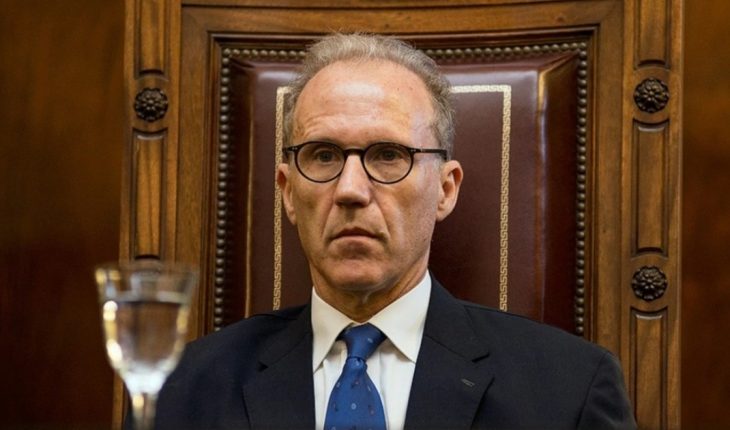On September 25, Deputy of the Front of All Vanesa Siley filed a request for a political trial against Judge Carlos Rosenkrantz for his actions in various cases of crimes against humanity, including the benefit of 2×1 in the “Muiña” case and from there, the magistrate presented a series of criticisms and accused of political persecution.” I have long been the target of a persistent smear campaign in different publications and by different personalities. I am falsely accused of misconduct, irregularities and offences of a different nature,” the supreme court member said in a new letter made and sent to different media outlets.
On this occasion, Rosenkrantz discredits all kinds of informed denunciation by Ms. Siley, ensuring that “the accusations are completely unfounded,” and stresses, “I have not failed to do any functional duty.” Among some of the causes in which he is accused of breaching his role, the application of the so-called 2×1 in cases of crimes against humanity appears, in this case in the causes “Muiña” and “Battle”. Against this, the magistrate defends himself and claims that they “find their support in the Argentine Constitution, in inter-American law and international human rights law.” I never intervened in a case where I had any obligation to excuse myself. Since I was appointed a judge, I have excused myself in all the cases in which the grounds of compulsory excuse were set up,” he adds, where he also refers to ties to Blaquier and an alleged obstruction of justice. “The legislator makes a fundamental mistake: one thing is the political trial, which aims to dismiss a judge for non-compliance with his duties, and another thing is the trial motivated by political, sectoral or other interests. I have not failed to do any functional duty,” he says. Carlos Rosenkrantz’s letter
I have long been the target of a persistent smear campaign in different publications and by different personalities. I am falsely credited with misconduct, irregularities and crimes of a different nature. So, for example, I have been charged before Federal Court 4 to have no less than 71 accounts abroad, all in my name, to collect bribes in numerous tax havens. The impe imputation is not only false, as I stated in a presentation I made in March this year in that courtroom, but completely crazy. I previously faced two other criminal charges: one for the crime of prevaricate for having signed the ruling “Muiña” (which discussed the applicability of the so-called “2×1” law) and one for being a participant during the time when he practiced the profession of lawyer in a fraudulent bankruptcy of a company that had a franchise of a hamburger in Pinamar and Villa Gesell. Both were dismissed by Judge Rafecas.Now an official member filed a request for a political trial in which she considers the cause of poor performance that would enable the opening of the proceedings in the Chamber of Deputies to investigate these facts and, where appropriate, move forward with my dismissal. The accusations are completely unfounded. I have not failed to do any functional duty. The Member considers that I incurred the cause of poor performance provided for in article 53 of the National Constitution for having subscribed to my votes in the cases “Muiña” and “Battle” (2×1). He claims that I will violate the constitutionality bloc that obliges the pursuit and condemn crimes against humanity and also social consensus. It contends that I frustrated “seriously the exercise of the rights and guarantees of the Constitution by having favored and often ensured impunity for those responsible for state terrorism through judgments contrary to existing law”. He says I drove with “ostensible contempt for citizen sensitivity and conscience” for having maintained my stance on 2×1 after the 2017 citizen protests and the sanction of Law 27.362. He also argues that I demonstrated a “misunderstanding of existing normative law” because my vote in “Battle” does not repair that crimes against humanity are in amestible or passable from pardon or commutation of sentence. It is curious that I am now accused of the sentence of “Muiña”, which was handed down three years ago and also signed by two other judges. It is also striking that I am accused of not giving in to protests in the streets. In any event, the truth is that, contrary to what the complainant states, the legal guidelines defended in my decisions on “2×1” (both in “Muiña” and “Battle”) find their support in the Argentine Constitution,inter-American law and international human rights law. The arguments are in the faults and I don’t want to repeat them here. I would just like to stress that, in general, they express my deep conviction that the Constitution enshrines criminal guarantees on behalf of the accused, including those who perpressed the most horrendous crimes in the history of our country. And I mean, in particular, that the accusation that I “did not repair” that crimes against humanity are not passable from amnesty, pardon or commutation of sentence reveals that the legislator has not even read my vote. I expressly explained in recitals 20 and 21 of my dissent in “Battle” why the count of sentence discussed in that case, as I see it, is by no means similar to an amnesty, a pardon or a commutation of sentence. The legislator also accuses me of delaying the resolution of the “Blaquier” case, a dossier that is pending, in what it describes as a “flagrant obstruction of judicial work”. It indicates that the cause in question is a long time ago and currently in my vocaly “thus delaying the resolution of the case and unjustifiably denying justice”. In addition, it questions me by “explicit links … with the powerful Blaquier family” because my wife sits on the Board of Directors of the NGO “Foundations” with a nephew of the accused. The information about the movement of the file that inspired this accusation is totally wrong although, interestingly, the correct information is available on the web. As arising from the Judicial Management System (LEX 100), the file was entered into the Supreme Court on June 5, 2015, that is, more than a year before I joined the Supreme Court on August 22, 2016. On the other hand, I had the case under study twice: from May 2, 2019 to July 11, 2019 and then between August 5, 2019 and November 15, 2019. When I returned the file on 15 November 2019, I requested Judicial Secretariat No. 3 to follow its procedure. I didn’t request it again and there was no obstruction of any kind. Of the 53 months they spent with the file in court, the cause was only in my Vocaly less than 10% of the total time. On the other hand, the accusation concerning my “explicit” ties to the Blaquier family on the basis that my wife is on a board of directors in a non-profit NGO dedicated to providing scholarships to low-income secondary students with someone who would be the defendant’s nephew is completely absurd. The indictment also attributes to me an “intentional contempt for human rights”, which would be stated in the fact that the Inter-Power Commission for the Coordination and Streamlining of Causes for Crimes of Humanity has never met since I assumed the presidency of the Court even though several human rights agencies repeatedly requested its urgent implementation. He adds that since I assumed the presidency of the body, much of my judicial and administrative decisions “have been geared towards closing the conquests and struggles that seek to vindicate the human rights movement.” Again, the accusation is unfounded. The legislator did not point to any specific decision taken in my character as President which has attacked the objectives it points out. I took office as a judge in August 2016. The last meeting of the Commission took place in September 2016. I was elected full of the body in September 2018. As is well known, the collegiate decision-making scheme that has governed since December 2018 by the dictation of Agreed 44/2018 requires that administrative and judicial superintendency decisions be taken with the will of at least three Ministers. However, the truth is that this year, following a request from some human rights agencies, the Court, by decision of its Ministers, reprinted this space of coordination to expedite the procedure and resolution of humanity cases and address logistical issues of these processes. In that context, I called for a meeting of the Interpower Commission for this Thursday, 8 October. The promotion of the political trial also vaguely mentions alleged conflicts of interest which supposedly forced me to excuse myself in different cases. I never intervened in a case where I had any obligation to excuse myself. Since I was appointed a judge, I have excused myself in all cases where mandatory grounds of excuse were set up. With regard to voluntary excusement, I adopted as a criterion to excuse or refrain from participating when I considered that my participation in the case could raise doubts about my impartiality in a reasonable person and thereby affect the decision to be taken by the Court.Finally the Member questions my intervention in the “Amelong” file. He points out that my stance unduly prioritized the situation of condemned for humanity. He mentions that this was an “legally inexplicable and absolutely arbitrary and discretionary decision” because during the extraordinary fair under the pandemic I ruled solely as a fair judge that it was not appropriate to enable the fair to deal with that case but I unilaterally enabled the Federal Oral Court 1 of Rosario to review whether the granting of home detention as the risk patient petitioner as a risky group in the framework of the pandemic was appropriate. In fact, on 1 April this year in the abovementioned case, I rejected the fair rating proposed by the accused, who questioned the restriction of his freedom, on the grounds that he had failed to meet the burden of demonstrating the existence of an irreparable levy for the fair rating to succeed. Notwithstanding the above, as soon as the defendant’s approach was linked to the situation of personal risk due to the pandemic given his age, medical history and deteriorated health condition, I ordered the urgent referral of his request to the Oral Court in The Federal Criminal 1 of Rosario, so that the judges would take the decision they deemed appropriate. The same procedure was adopted with other defendants. In short, the accusations are unfounded. Finally, I would like to stress that in her complaint the legislator evoked a quotation of doctrine which states that “it is a political procedure, for political purposes, which is based on political causes, the consideration of which rests with a political body and subordinated to a political judgement”. As I see it, the legislator makes a fundamental mistake: one thing is political judgment, which aims to dismiss a judge for non-compliance with his duties, and another thing is the trial motivated by political, sectoral or other interests. I have not failed to do any functional duty.





